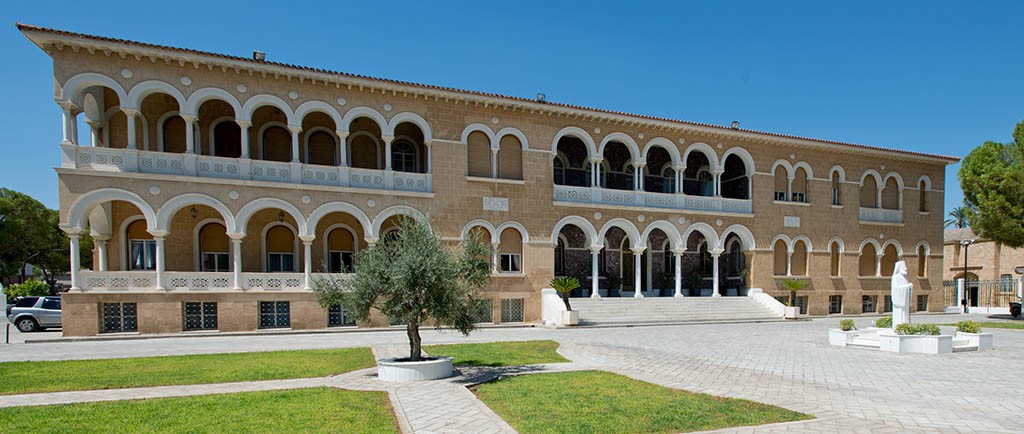The history of the Archbishop’s Palace in Nicosia
The Archbishop’s Palace was built in the 50’s and 60’s in the Venetian style, and has a reputation as being one of the most majestic and beautiful in Cyprus.
It’s a two storey building in the centre of Nicosia, decorated with high arches, large windows and elegant moldings.
Makarios III was the youngest and most legendary Archbishop of Cyprus. After his death a huge bronze statue was erected in front of the palace in his honour.
Despite the fact that the Archbishop’s Palace is not very old, it has already suffered considerable damage due to the military conflict in 1974, and the palace was completely restored in the 1980’s.
Interesting Facts
You can still see the old palace, built in the 15th century in the Gothic style, and the Cathedral of St. John the Evangelist from the 17th century.
The National Struggle and Folk Art Museums are located in the old Archbishop’s Palace.
St. John the Evangelist Cathedral looks quite modest from the outside, but it has a rich interior. It’s famous for its finely carved, three-tiered iconostasis, covered with gold leaf, and the beautiful frescoes that adorn the interior walls of the cathedral.
Cathedral of Saint John the Evangelist is open:
- Monday – Friday: 08:00 – 12:00 and 14:00 – 16:00;
- Saturday: 08:00 – 12:00;
- During festive services.
For normal services
The palace is the personal residence of the Archbishop. All services of the Diocese of Cyprus and several museums are located on the palace grounds.
Ethnographic Museum of Cyprus
On the ground floor of the old Archbishop’s Palace is an ethnographic museum, which houses a vast collection of Cypriot folk art from the 19th and 20th centuries.
The museum’s exhibits include traditional costumes, pottery, homemade wooden utensils, embroidery, tapestries and fabrics made by handlooms.
Opening hours
- Tuesday – Friday: 09:30 – 13:00 and 14:00 – 16:00;
- Saturday: 09:00 – 13:00;
- Closed on public holidays, Sundays and Mondays.
Tickets
- €2;
- €1 for students.
The Byzantine Museum
On the ground floor of the new Archbishop’s Palace is the Byzantine Museum, which was opened in 1982.
In the Byzantine museum you will find a rich collection of icons from the 9th – 14th centuries in the Common Era, books and church plates, parts of the iconostasis and many other works of art. One of the most valuable attractions of the museum is the famous mosaics of the 6th century, brought from the church of Panagia Kanakaria situated in northern Cyprus.
Opening hours
- Monday – Friday: 09:00 – 13:00 and 14:00 – 16:00;
- Saturday: 09:00 – 13:00;
- Closed on Sundays and public holidays.
Tickets
- €4;
- €2 for students.
The Art Gallery
The Art Gallery occupies 4 rooms on the top floor of the Archbishop’s Palace.
The gallery shows works from Western Europe from the 15th – 19th centuries, engravings and maps from the war for Greek independence in 1821, as well as Cypriot and Greek works of art.
The Art Gallery occupies 4 rooms on the top floor of the Archbishop’s Palace.
The gallery shows works from Western Europe from the 15th – 19th centuries, engravings and maps from the war for Greek independence in 1821, as well as Cypriot and Greek works of art.
- Winter (from September 16 to April 15 on a daily basis): 08:30 – 17:00;
- Closed on public holidays.
Tickets
- €4;
- €2 for students.
In the palace of the archbishop in Nicosia, you can visit the library, the National Struggle Museum and the research centre. The private apartments of Archbishop Makarios are very rarely open for visitors.
How to get to the Palace
The Archbishop’s Palace is located in the central part of the old town of Nicosia, at Archbishop Kiprian’s Square (Archbishop Cyprian Square), opposite the Pan Cyprian gymnasium.
You can walk through the old town of Nicosia from the central bus station. If you are driving it’s best to leave the car in one of the car parks by wall and walk to the palace from there, as parking can be quite problematic.
